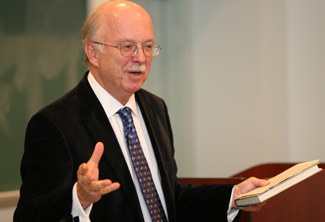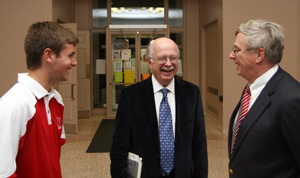The first installation of Wabash’s celebration of the bicentennial of Abraham Lincoln’s birth, a speech given by Professor Ronald C. White on Lincoln’s second inaugural address, was hosted in the Lovell Lecture Room Wednesday night. The event, sponsored by the Brigance Forum, Hadley, and Rogge funds, was the first of many that will be held on campus throughout the 2008-2009 school year.
 Professor White, a Fellow of Huntington Library in California, Visiting Professor of History at the University of California-Los Angeles, and Professor Emeritus of American Religious History at San Francisco Theological Seminary, is the author of two books on Lincoln. The first, Lincoln’s Greatest Speech: The Second Inaugural, is a Washington Post and San Francisco Chronicle best seller as well as a New York Times Notable Book of the Year, and was the basis for his forum Wednesday evening. The other book, Eloquent President: A Portrait of Lincoln Through His Words, is a Los Angeles Times best seller and Book of the Month Club and History Book Club selection. White also plans to release a biography of Lincoln in 2009, coinciding with the bicentennial of his birth, February 12.
Professor White, a Fellow of Huntington Library in California, Visiting Professor of History at the University of California-Los Angeles, and Professor Emeritus of American Religious History at San Francisco Theological Seminary, is the author of two books on Lincoln. The first, Lincoln’s Greatest Speech: The Second Inaugural, is a Washington Post and San Francisco Chronicle best seller as well as a New York Times Notable Book of the Year, and was the basis for his forum Wednesday evening. The other book, Eloquent President: A Portrait of Lincoln Through His Words, is a Los Angeles Times best seller and Book of the Month Club and History Book Club selection. White also plans to release a biography of Lincoln in 2009, coinciding with the bicentennial of his birth, February 12.
White spent time in Wabash classrooms before his evening talk.
After being introduced by religion major Robert Bloss ’09, White began his speech by painting a vivid image of the Lincoln Memorial in his listeners’ minds. Throughout the course of the evening he repeatedly asked the audience for their input, and began by asking audience members who had seen the memorial to describe the feeling. Most described a sense of awe, especially one who claimed to see the memorial on April 4, 1968, the night when Dr. Martin Luther King, Jr., was assassinated.
"The typical response is awe," White said. "But awe is not the same thing as understanding."
White illustrated his point by depicting his undergraduate experience in an a capella choir. "The music was beautiful, and it left in me a sense of awe," White explained. "But I didn’t understand the music, so I took two music appreciation courses the next year, one in Bach and one in Beethoven. That is what I hope I can do with this forum tonight, is help people understand."
 White said Lincoln claimed the second inaugural as his greatest speech throughout his presidency, even though it was not "immediately popular." White then proceeded to his forum to help the audience determine exactly why Lincoln’s greatest speech was not immediately popular.
White said Lincoln claimed the second inaugural as his greatest speech throughout his presidency, even though it was not "immediately popular." White then proceeded to his forum to help the audience determine exactly why Lincoln’s greatest speech was not immediately popular.
"If you pay attention to political rhetoric today, there is plenty of hyperbole. Lincoln chose to do the exact opposite in the second inaugural. He diminishes expectations."
Lincoln did it through several literary devices, including beginning his address with very generic statements, such as "… little that is new could be presented." White focused his forum on such literary tools.
Lincoln used inclusive language. Instead of demonizing the opponent, as modern politicians would do, Lincoln frequently used the word "all" to refer to the Union and the Confederacy as a unit. "All dreaded it [war]," Lincoln said in the second paragraph, "all sought to avert it." According to White, Lincoln could very easily have echoed the sentiments of his generals, and would have rallied the men and women present, who had all lost a son, husband, or brother to the South. But Lincoln did not do this.
"Instead, he chose not to illicit the emotion of the crowd," White said. Lincoln constantly employed alliteration, one of his favorite devices. In the second paragraph, he did it by repeating the initial letter d eight times. This gave the speech rhythm, or as White aptly described it, "invisible symmetry."
Lincoln used repetition throughout his rhetoric. Within the same paragraph brimming with alliteration, Lincoln repeats the word war to exemplify his understanding of the nature of the war; that is to say, despite the claims of Union generals that the North was in control of the war, they were in fact not in control. The war controlled them.
White continued by arguing Lincoln was not racist due to his extensive discussion of race in the second inaugural, which implies that Lincoln deeply hated slavery. He also claimed Lincoln was more religious than past presidents, who merely mentioned God in their concluding paragraphs. By stark contrast, Lincoln mentioned God 14 times, Scripture four times, and invoked prayer three times in his smallest speech, which contained only 701 words.
Lincoln also made a bold move in his third paragraph, by referring to slavery as "American Slavery," thus placing the blame for the enslavement of Africans on the shoulders of not only Southerners but also the Northerners. He ends the speech with a call for forgiveness of the Confederacy.
White, who read the diaries of people present at the address, explained the speech caused much anger in the crowd, who were deeply grieved by the wrongs suffered at the hands of the South. That was part of his effort to reinforce the thesis that Lincoln was right when he claimed his speech was not immediately popular. White then ended his speech by having the audience read aloud the final paragraph of Lincoln’s speech, which called for a "lasting peace, among ourselves, and with all nations."
Curiously enough, White was not a student of Lincoln, but decided to "jump into it" after offering an undergraduate seminar on Lincoln at UCLA.
"I was turned on to his words, which I had never noticed before," White said, "and I was struck by how interested the students were."
The effect of the seminar is evident; White speaks about Lincoln with undisguised passion. Describing Lincoln as a tall, gawky man that had a high voice and dressed in a homely fashion, White nevertheless concedes that Lincoln was a powerful speaker that captivated his audience, despite his lack of a formal education and his father’s discouragement of reading books.
The event, open to the public, was well received by both the Wabash and Crawfordsville communities.
Jacob Moore ’11, a political science major, said, "I was legitimately impressed."
Another political science major, Jacob Surface ’11, wished that the forum contained more subjective analysis of Lincoln, such as excerpts from his diary.
"In any case, I still applaud the research done," he said.
Robert Bloss reminded the attendees that the next event in the Lincoln bicentennial series would be a talk given by Anderson University Professor of History Brian Dirck. The talk, entitled "Abraham Lincoln: The Lawyer in the White House", will be hosted Wednesday, November 12.